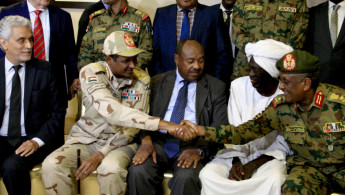Final Sudan agreement delayed amid new political divisions
A Sudan legal committee has postponed the delivery of the draft final agreement between the military and protesters regarding a planned transitional government, sources said on Thursday.
The Sudanese Transitional Military Council (TMC) and the citizen-led Forces for Freedom and Change (FFC) said disagreements regarding "technical" issues had led to the latest fall-out between the two sides, according to a statement by an African mediation source.
On Friday, the same day the breakthrough agreement was reached, the two sides agreed to form a legal committee entrusted with drafting the political agreement.
But a mediator, in a brief statement to the press at the Corinthia Hotel in Karthoum, has said that the committee is delaying the delivery of the draft agreement to the parties till an unspecified date.
Sources to The New Arab cited new differences between the TMC and the FFC as the cause.
The power-sharing deal comes after intense mediation efforts by Ethiopia and African Union diplomats.
In a breakthrough that seemed to end the political deadlock in Sudan, the military and pro-democracy leaders agreed last week on a joint sovereign council that will rule for a little over three years while elections are organised.
|
A military leader will head the council for the first 21 months followed by a civilian leader for the next 18.
Gen. Abdel-Fattah Burhan, head of the military council, said in TV comments late on Sunday the army could withdraw from governing the country after the end of the first 21 months.
He said the military is discussing the candidates for the sovereign council with the Force for Declaration of Freedom and Change, which represents the protest movement.
Sudan's ruling military council and protest leaders agreed the ruling body would have a rotating presidency, a breakthrough following months of political impasse after the army in April ousted long-time ruler Omar al-Bashir on the back of a popular uprising.
Tensions climaxed on 3 June when armed men in military fatigues stormed a long-standing protest camp in Khartoum, shooting and beating crowds of demonstrators in a pre-dawn raid.
Dozens were killed, triggering international outrage, although the generals insisted they did not order the violent dispersal of protesters.
With internet in Sudan restored Tuesday, videos have surfaced on social media showing Sudanese paramilitary forces using brute force to disperse the pro-democracy sit-in June.
The army seized power after the ousting long-time ruler Bashir following months of nationwide protests against his iron-fisted rule of three decades, but have resisted transferring power to a civilian administration.
Follow us on Twitter: @The_NewArab





 Follow the Middle East's top stories in English at The New Arab on Google News
Follow the Middle East's top stories in English at The New Arab on Google News


